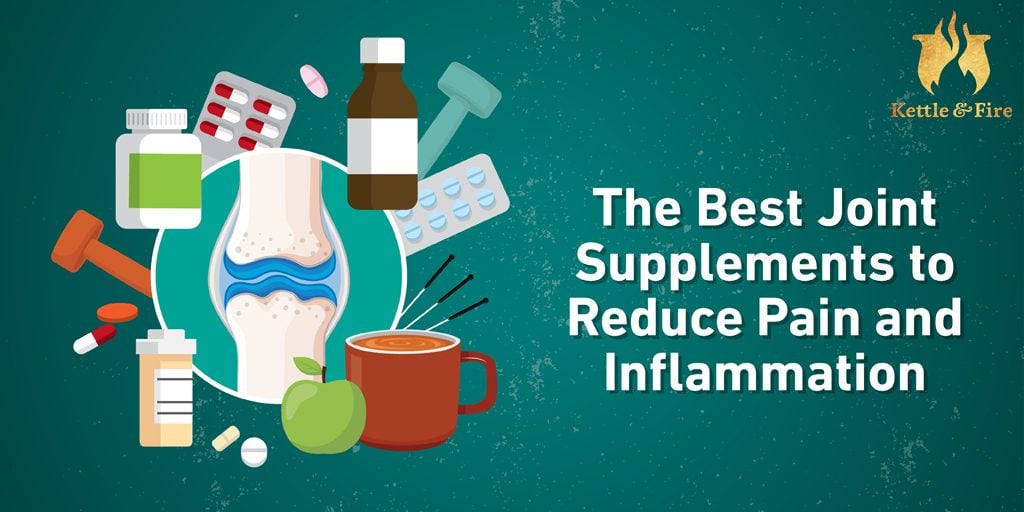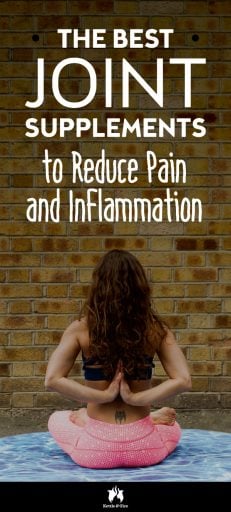The Best Joint Supplements to Reduce Pain and Inflammation (Plus Natural Alternatives to Supplements)

Rows and rows of joint supplements line the shelves at drug stores claiming to ease pain and reduce inflammation in your joints. With so many options and brands offering joint support, it’s hard to know what to choose — or even if it’s worth spending the money (even with those great money-back guarantees). Different doctors might recommend different supplements, making it more confusing.
While the most common supplements are glucosamine and chondroitin, there’s some evidence that supplementing with Omega-3 oils, capsaicin and curcumin might aid in reducing pain and discomfort.
Here’s a rundown the most common joint supplements, how they work and whether or not they’re the right thing for you.
The Most Common Joint Supplements
1) Glucosamine
Glucosamine, a building block of cartilage, ligaments and tendons, plays a critical role in your body. In your joints, it acts as a natural shock absorber and joint lubricant, allowing your body to move without pain. In your gut, glucosamine helps form the connective tissues that make up your digestive tract.
In supplement form, glucosamine or glucosamine sulfate works by supplying your body with more of this building block to help make repairs for achy joints and tendons. Some clinical studies have shown that daily glucosamine supplementation can promote joint health, lower inflammation and reduce joint pain and tenderness. It can also protect and repair the gut lining and ease irritation in the stomach, bladder and intestines.
People who take daily doses of glucosamine supplements have claimed to see results in six to eight weeks with a daily dose of 500 to 1500 milligrams, depending on height and weight.
As the main compound in chitin — the material found in crustaceans and shellfish — most glucosamine supplements are not vegetarian. Some vegetarian sources of this compound can be found in mushrooms and processed grains.
2) Chondroitin
While most often used in combination with glucosamine, chondroitin sulfate can also be taken as a supplement on its own in liquid or powder form. Chondroitin is derived from the natural cartilage of animals.
Studies have shown that chondroitin could actually suppress inflammatory pathways in the body and possibly even slow the progress of joint damage. Chondroitin sulfate is a building block for cartilage. It has been shown to give back to what might be missing around painful joints in terms of promoting cartilage formation and repair.
3) MSM
Methylsulfonylmethane, or MSM, is another supplement that can help form connective tissue and repair joints, tendons and ligaments. While it can be taken orally, this naturally occurring sulfur compound also comes in a topical cream.
MSM enters the blood very quickly and can start working in less than an hour. However, most people taking the supplement don’t notice the effects until two weeks in. Glucosamine, chondroitin and MSM can come packaged as one supplement.
4) Omega-3 Oils
DHA and EPA are the two types of Omega-3 fatty acids found in fish oils that reduce swelling and pain around the joint areas. Fatty fish like salmon and mackerel are the best sources of Omega-3s, but the same benefits can be found in pill form.
A diet rich in Omega-3s is a powerful tool to prevent conditions like arthritis pain. Fish oil supplements contain the most common form of Omega-3.
5) Curcumin
Turmeric has recently been touted for its anti-inflammatory properties, mostly because of curcumin, the active ingredient in turmeric.
However, curcumin only makes up about three percent of turmeric, which is why doctors have recently started recommending curcumin supplements of 200 to 1,000 milligrams to actually get an effective amount to ward off or reduce inflammation.
Research suggests that arthritis pain or inflammation may be caused by free radicals that cause oxidative stress in your body. High antioxidant foods, such as turmeric, may neutralize free radicals.
6) Capsaicin
Capsaicin, or the purified, heat-producing component in chili peppers, is used to activate the nerve receptors causing heat in your body and keep your body from processing pain signals. In essence, studies have show that capsaicin can reduce the pain from rheumatoid arthritis, osteoarthritis and fibromyalgia by masking the pain these conditions cause.
This supplement is taken as a softgel or applied as a topical cream or patch.
The Cons of Using Joint Supplements

Do They work?
While the majority of joint supplements on the shelves contain glucosamine, there are several conflicting studies examining whether or not taking glucosamine supplements works. A 2010 analysis of multiple studies found that among 3,800 people with osteoarthritis of the knee and hip had no better results taking glucosamine, chondroitin or a combination of both supplements than people who took placebo pills.
There have been much fewer studies conducted of MSM. The verdict also is still out on the benefits of Omega-3 supplements and curcumin.
With capsaicin, you’re masking the pain as opposed to taking steps to cure your body.
Potential Side Effects
While all of these supplements are generally considered safe, there are potential risks, as with any medication. In the most recent clinical trial, patients taking a combo of glucosamine-chondroitin reported diarrhea and abdominal pain. Others reported heartburn, drowsiness, headaches and allergic reactions.
While the most recent study was encouraging, it was also cautionary. It found that in mice, the equivalent of regular doses of over-the-counter MSM had less degeneration of the cartilage in their knees than the control animals. However, ones receiving megadoses of the dietary supplement showed signs of spleen damage and a bad liver.
Since most of these supplements are made from shellfish, there’s also a risk of an allergic reaction for anyone already allergic to shellfish. Glucosamine and chondroitin may also interact with some other drugs, like blood thinners.
With Omega-3 supplements, there’s a risk of overdosing on vitamin A.
Natural Alternatives to Relieve Joint Pain

Drink Bone Broth
Bone broth, which is packed with glucosamine and chondroitin, is one of the best natural sources to relieve joint pain, reduce inflammation and improve joint mobility. And unlike joint supplements, it also comes with a whole host of other added nutrients that are good for your body, including collagen and magnesium.
Exercise and Diet
Build up the muscles that support stressed joints by doing physical activity such as strength training. You can loosen up stiff joints and maintain healthy joints by working out. Maintain a healthy weight to take pressure off your knees and ankles by eating a healthy diet of whole foods and exercising.
Acupuncture and Massage
While inserting needles into joints may not sound like the best form of healing, acupuncture is often used for chronic pain. Recent studies found that it may offer some temporary pain relief.
Conclusion
While supplements may be helpful in easing certain types of joint pain, it might not solve the issues altogether. It might take more than a supplement to manage complicated life conditions like arthritis and osteoporosis, regardless of brand or dosage.
As always, you should check with your doctor before starting any sort of supplement regimen or introducing anything new into your diet.










